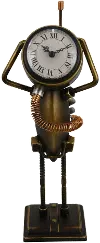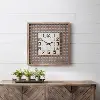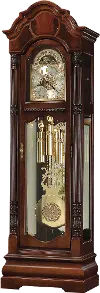RC Willey Furniture Home Decor Clocks
Shop Clocks at RC Willey
Never be late again. Freshen up your walls with a decorative wall clock. Choose from modern or traditional designs to add style, enhance your decor, and keep you on schedule. A perfect blend of beauty and function.
#myrcwilleyhome
See how real customers are transforming their spaces with RC Willey. Get inspired, share your style, and create a space that's Your Home. Your Way.
Explore NowSelecting the Right Clocks for Your Home
When choosing clocks for your home, it's important to consider both style and functionality to find the perfect fit. Here's a breakdown of how to select the right clocks.
Understanding Your Style Preferences
Start by identifying the styles that appeal to you. Are you drawn to vintage, modern, rustic, or minimalist designs? Understanding your style preferences helps narrow down the options and ensures the clock you choose enhances the overall atmosphere of your space.
Matching Clocks with Home Décor
Think about how the clock's design, color, and material will blend with your existing décor. A clock can serve as a focal point, a complementary accent, or a subtle addition. Choose clocks that align with your color palette, furniture style, and room layout to create a cohesive look.
Explore Popular Types of Clocks
When choosing a clock, it's not just about telling time—it's about making a style statement and adding character to your space. From wall clocks to classic floor designs, there's a wide variety to explore. Here's a look at some popular types:
- Wall Clocks
Wall clocks are a versatile and functional choice for almost any room. Whether you're looking for a large statement piece or a subtle accent, wall clocks come in a range of styles, from traditional to modern. They can serve as focal points in your living room or add a practical touch to your kitchen or office.
- Table Clocks
Perfect for desks, shelves, and bedside tables, table clocks bring a charming and convenient timekeeping option to any room. These clocks can be both decorative and functional, often with unique designs that reflect various décor styles—from elegant brass finishes to playful vintage pieces.
- Floor Clocks
Floor clocks, including classic grandfather clocks, are ideal for those who want a timeless and traditional look. These standing pieces make a bold statement, often featuring intricate details and craftsmanship that can enhance formal spaces like living rooms or entryways.
Features to Consider When Choosing Clocks
Choosing the perfect clock isn't just about style—it's also about finding a timepiece that fits your space and lifestyle. From size to material, here are the key features to consider when selecting a clock.
Size and Dimensions
Selecting the right clock size can make all the difference in your décor. Here’s a guide to help you choose the best dimensions for your space:
- Wall Clocks: Wall clocks can range from small, subtle accents to large, bold statement pieces. Here are some common size ranges -
- Small Wall Clocks: Typically 10 to 12 inches in diameter. Ideal for compact spaces like a bathroom, small kitchen, or cozy reading nook.
- Medium Wall Clocks: Around 14 to 18 inches in diameter. A great choice for a standard living room wall, above a fireplace, or in a home office.
- Large Wall Clocks: 20 inches and up, sometimes even reaching 36 to 40 inches for a dramatic statement. These are perfect for large living rooms, dining rooms, or open-concept spaces.
- Table Clocks: Table clocks are generally smaller and designed to fit on shelves, desks, or bedside tables. Standard sizes include -
- Compact Table Clocks: 4 to 6 inches in height, small enough to serve as decorative accents without dominating a space.
- Medium Table Clocks: 7 to 12 inches in height, offering a bit more presence while still fitting comfortably on a shelf or desk.
- Floor Clocks: Floor clocks, including grandfather clocks, are often used as statement pieces in larger rooms. Common dimensions include -
- Standard Grandfather Clocks: Typically 6 to 7 feet tall (72 to 84 inches) with a width of around 20 to 24 inches. These clocks can require 10 to 12 inches of depth, so ensure you have enough space.
- Slim Floor Clocks: For tighter spaces, you can find slender designs that are around 5 to 6 feet tall with a narrower width of 12 to 16 inches.
Material and Build Quality
Clocks come in a variety of materials like wood, metal, glass, and plastic. Choose a material that complements your room's décor and offers the durability you need. For example, a solid wood clock can add warmth to a traditional space, while sleek metal or glass options fit modern or minimalist interiors.
Timekeeping Accuracy
Not all clocks are created equal when it comes to keeping time. Some clocks are purely decorative, while others prioritize precision. Consider quartz movement for accuracy or traditional mechanical clocks for a classic appeal. Ensure the clock you choose aligns with your needs for accurate and reliable timekeeping.
Enhance Your Space with Stylish Clocks
Clocks are more than just functional items; they can transform a room's ambiance and become a key part of your décor. Here’s how to make the most of stylish clocks in your space.
How Clocks Add Ambiance
A well-chosen clock can set the tone for your space, adding warmth, elegance, or a touch of modern flair. Large wall clocks can serve as statement pieces that draw the eye and create a cozy atmosphere, while smaller clocks can provide subtle accents that enhance a room's personality. Consider how the clock’s design and color scheme play off your existing décor, creating a harmonious and inviting space.
Combining Functionality with Elegance
The best clocks seamlessly blend practicality with style. Look for pieces that not only tell time but also elevate your room's look—like a sleek, modern clock with clean lines for a contemporary vibe or a vintage clock with intricate details for a traditional setting. Balancing aesthetics with reliable timekeeping helps ensure your clock serves as both a beautiful and useful addition to any room.
FAQs About Clocks
Choosing the right clock and keeping it in top shape can sometimes raise a few questions. From selecting the best type to ensuring it stays accurate over time, here are answers to some of the most common clock-related concerns.
Common Questions and Concerns
- What size clock should I choose for my space?
It depends on the room's dimensions and the intended style. Large clocks can act as statement pieces, while smaller ones are better for accenting a space. Measure your wall or tabletop area before deciding to make sure it fits perfectly.
- What’s the difference between quartz and mechanical clocks?
Quartz clocks are battery-operated and known for their accuracy, requiring little maintenance. Mechanical clocks, on the other hand, use traditional gears and require winding, but they offer a classic aesthetic and craftsmanship.
- How do I hang a heavy wall clock securely?
Use wall anchors or studs for heavier clocks to ensure they’re safely mounted. Always follow the manufacturer's instructions for installation, especially with larger and heavier designs.
- What should the average person spend on clocks?
The price of a clock can vary significantly depending on its style, materials, and craftsmanship. For a simple wall or table clock, you might spend between $20 to $100 for a quality piece. Mid-range clocks, including those with unique designs or better materials, can range from $100 to $300. If you’re looking for an heirloom-quality clock, like a grandfather clock or a custom-designed piece, prices can go well above $1,000. It all depends on your budget, the clock's purpose, and how it fits into your décor.
Tips for Clock Maintenance
- Keep It Clean: Dust and dirt can affect a clock’s functionality. Use a soft cloth to gently clean the exterior and avoid harsh chemicals that could damage the finish.
- Battery Changes and Winding: Replace batteries in quartz clocks regularly, and keep an eye on mechanical clocks to ensure they’re wound as needed. This helps maintain accuracy and keeps your clock running smoothly.
- Protect from Direct Sunlight: To avoid fading and potential damage to delicate mechanisms, try to keep clocks out of direct sunlight, especially if they have wooden or intricate finishes.




















